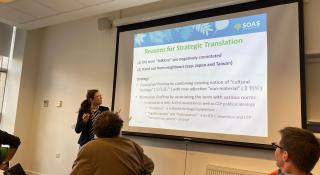
Breadcrumbs navigation
Degrowth, global asymmetries, and ecosocial justice: Decolonial perspectives from Latin America
In this short video abstract, author Miriam Lang discusses the key arguments from her new Review of International Studies article -'Degrowth, global asymmetries, and ecosocial justice: Decolonial perspectives from Latin America'.
Want to know more? You can read the full article at DOI: https://doi.org/10.1017/S0260210524000147
This particular article is open access, however BISA members receive access to all articles in RIS (and our other journal European Journal of International Security) as a benefit of membership. To gain access, log in to your BISA account and scroll down to the 'Membership benefits' section. If you're not yet a member join today.
Abstract
How do governing actors in international politics become legitimised? Current approaches to the study of legitimation do not fully account for the complexities of governance in contemporary international and global politics because they pre-specify ‘sources’ of legitimacy and treat change in audience expectations towards rightful rule as exogenous to legitimation processes. Instead, this article synthesises existing models of legitimation with relational theory to argue that constellations of institutional complexities necessitate an analytical focus on audiences and their expectations as embedded in governance networks. It then provides a relational theory of legitimation, emphasising the mechanisms undergirding legitimation: legitimation should be conceptualised as a process of congruence-finding between actors’ normative expectations. A governance relation might be influenced towards greater or lesser congruence via several mechanisms working at the level of the relation and the wider network, with more congruence giving rise to stabler governance practices. In this way, the theory builds upon legitimation scholarship by developing pathways to investigate legitimation across the varied contexts of international politics: it avoids a normative background theory of legitimacy sources and provides an improved framework for understanding change in the legitimacy of institutions over time by considering endogenous mechanisms of legitimation.


